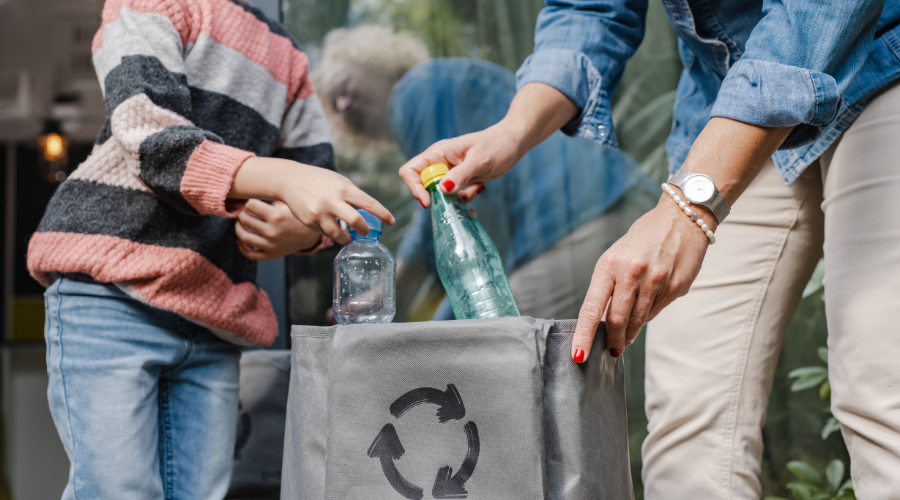Eco-Friendly Habits: Saving the Planet and Your Wallet with Smarty
This blog/post may contain links to third party merchants. Smarty earns commissions on purchases you make using these links.

In recent years, as climate change has become a growing concern, there has been a significant increase in focus on sustainability and eco-friendly habits. Many individuals are now actively seeking ways to reduce their carbon footprint and adopt more environmentally friendly practices to mitigate the damage caused by human activities such as deforestation, livestock farming, use of fossil fuels, plastics, and CFCs. By embracing eco-friendly habits, we can reduce our carbon footprint and help preserve the environment for future generations. In this article, we will explore some of the top eco-friendly habits that you can incorporate into your daily routine to promote a more sustainable world.
1. Reduce, Reuse, Recycle

Adopting a green lifestyle starts with the three Rs: Reduce, Reuse, and Recycle. By minimizing waste, reusing items, and recycling materials, we can conserve natural resources and limit the amount of waste that ends up in landfills, significantly reducing our environmental impact. You can incorporate these eco-friendly habits by following the 3R principles:
- REDUCE your energy consumption by turning off the lights and appliances when not in use. Consider investing in energy-efficient lighting.
- Be conscious of your purchasing decisions; only buy what is necessary, and avoid materials with excessive packaging.
- Fix broken items or find ways to REUSE old items instead of throwing them away.
- Donate or exchange items that are still in good condition but no longer serve your purpose, so they can be REUSED by others.
- Say no to plastic and switch to REUSABLE bags, water bottles, storage containers, and other eco-friendly products.
- Repurpose your old cardboard boxes, tires, and clothes to REUSE them as planters, storage boxes, and cleaning mops.
- Commit to eco-friendly shopping habits and buy products made from RECYCLED materials.
- Sort your waste into plastic, paper, glass, and metal categories to make RECYCLING efficient. Leverage your local recycling programs to dispose of these materials.
2. Reduce Water Usage

Despite 71% of the earth’s surface being covered with water, severe water shortages are becoming increasingly common. According to a report from UNICEF, four billion people worldwide experience severe water scarcity for at least one month each year, and this number could reach 700 million by 2030. These alarming statistics highlight the urgent need to reduce our water usage and conserve water, starting from our homes, where every drop counts. Here are some simple practices you can adopt to conserve water:
- Start with your hygiene practices by turning off the faucet while brushing your teeth and taking shorter showers.
- Act immediately to fix the leaks in your home and invest in water-saving appliances like washing machines and dishwashers.
- Use barrels to collect rainwater and use the rainwater to irrigate your garden and lawn. You can also install drip or sprinkler irrigation systems to water your garden.
- Reuse the wastewater from your washing machines and the kitchen sink to water your plants or toilets. You can even reuse the water from washed vegetables, pasta, or rice to water your plants, as they serve as nutrients.
3. Opt for Sustainable Transportation

The transportation sector is responsible for the largest share of greenhouse gas emissions, accounting for 28% of total GHGs. Personal vehicles that burn fossil fuels, including cars, trucks, ships, trains, and planes, contribute to these emissions. Opting for sustainable transportation and reducing reliance on personal vehicles can help decrease greenhouse gas emissions and air pollution. Consider the following ways to commute sustainably:
- Try using public transportation services like buses, trains, and subways. This helps reduce carbon footprints and traffic congestion, and you can save on fuel bills.
- You can opt for carpooling services or rideshare options from Uber, Lyft, and BlaBlaCar.
- Walking and cycling are the most eco-friendly transportation mode as they don’t involve burning fossil fuels. In fact, it helps burn calories and keeps you healthy & fit.
- If you love your personal space and need a car, consider purchasing an electric or fuel-efficient vehicle. This will help reduce carbon emissions and your dependence on fossil fuels.
4. Choose Energy-efficient Appliances

We are all advised to save energy by turning off the lights, fans, and other appliances like television or air conditioner. But did you know going green with your appliances is also a great way to reduce your carbon footprint and practice a sustainable lifestyle? Buying the products with an ENERGY STAR label is recommended while shopping for appliances like air conditioners, refrigerators, and washing machines. These appliances are designed to use less energy and save money on electricity bills, so it’s definitely a win-win. Here’s what you can follow while choosing your appliances-
- Understand your needs and buy the appliances with the right model and size that fit your needs. Big appliances consume more energy and are not eco-friendly.
- Consider the energy-saving features of your appliances by reading the product specifications. Understanding that using eco-mode on your dishwasher can save energy and adjusting the water levels according to your laundry load can help you save water is an eco-friendly habit.
- Maintaining your appliances is another excellent eco-friendly practice. Regular maintenance, such as cleaning filters and checking for leaks, ensures your appliances operate efficiently. Additionally, following the manufacturer’s recommendations for usage, such as loading your dishwasher and washing machine to their full capacity, can help optimize energy savings.
Also Read: Buying Guide: Consider These 5 Things When You Buy A Vacuum Cleaner
5. Switch to Eco-Friendly Cleaning Products

Conventional cleaning products like detergents, surface cleaners, and disinfectants contain harmful chemicals like ammonia, chlorine, and phthalates that can pollute water sources and harm aquatic life. Switching to eco-friendly cleaning products made with natural ingredients can help protect the environment and your health. Start adopting a greener lifestyle by incorporating these changes in your life:
- Replace disposable cleaning tools like paper towels and sponges with reusable cleaning tools like microfiber clothes or washable mops.
- Read the labels on the cleaning products to ensure they are made of eco-friendly ingredients.
- Choose products with concentrated formulas as they require less packaging.
- Use homemade cleaning products like vinegar, baking soda, and lemon juice to reduce the waste generated from chemical substitutes. You can also use castile soap for cleaning utensils and add essential oils to your cleaning solutions to boost their cleaning properties.
6. Grow Plants and Maintain Green Spaces

Planting trees contributes to a cleaner, healthier environment, helps mitigate climate change, and promotes biodiversity by absorbing carbon dioxide, improving air quality, reducing soil erosion, and providing habitat to wildlife. Furthermore, growing food in your condos, backyard, or community garden can promote a healthy lifestyle and reduce the environmental impact of the transportation of food. Start your green oasis with home gardening, planting trees in local parks, or participating in reforestation programs. You can even start composting your food waste to reduce the waste going to landfills and maintain lush green plants.
Related Article: Spring Gardening: A Guide To Build Your Plant Paradise All Over Again!
7. Support Organic and Fair-Trade Products

Buying organic and fair-trade products is an environmental, economic, and socially conscious choice. Choosing these products can help take the food system towards a more sustainable and ethical future. Foods labeled as organic are healthy and devoid of chemicals and promote soil health, reduce erosion, and support biodiversity. Shop from local farmers’ markets to get fresh, seasonal produce. When shopping for groceries, always look for organic and fair-trade labels. You can shop for organic foods from stores like Thrive Market, Costco, Walmart, Target, Kroger, and Safeway.
8. Adopt a Plant-Based Diet

One of the most common eco-friendly habits individuals can adopt is altering their food choices and following a plant-based diet. Choosing a plant-based diet, even a few days a week can significantly reduce greenhouse gas emissions and deforestation associated with animal agriculture. This dietary choice involves consuming foods derived from plants and minimizes the consumption of animal products, and it comes with numerous health and environmental benefits along with animal welfare. To adopt a plant-based diet, consider small and gradual transitions. Make mindful choices and start with going for meatless meals once or twice a week and gradually increase the frequency.
Related Article: The Ultimate Guide to a Plant-Based Diet: Save Money and Get Cashback with SmartyPlus
9. Switch to Green Energy

Transitioning to green energy sources like solar, wind, or hydroelectric power reduces the dependency on fossil fuels and reduces carbon emissions. They are clean, sustainable, and naturally replenished, so we can reduce greenhouse gas emissions and mitigate climate change. Although the initial cost of installing these energy sources is high, their long-term benefits outweigh the costs. Undoubtedly, this is among the best eco-friendly habits you can practice.
- First, plan your energy purchase options and research local providers that offer renewable energy services.
- Install solar panels at your home or business to reduce your reliance on electricity.
- If you have land and resources, install a small-scale wind turbine on your property.
- Make informed choices about your energy consumption by investing in energy-efficient appliances and fixing repairs and energy leaks.
- Learn about the benefits of renewable energy sources, educate your friends and family, and advocate policies that promote sustainable energy.
10. Support Sustainable and Ethical Brands

Adopting eco-friendly habits, such as supporting sustainable and ethical brands, can significantly reduce our carbon footprint and protect the environment. When shopping for apparel, beauty products, home goods, and furnishings, it is essential to opt for brands that prioritize eco-friendly practices, fair labor standards, and cruelty-free products. To support sustainable and ethical brands, consider adopting these practices:
- Research brands that follow environmental, social, and ethical practices before you make your purchasing choice. You can verify a company’s commitment to sustainability and ethics by checking for certifications such as Fair Trade, B Corp, and organic.
- Follow minimalism and prioritize quality over quantity. Invest in high-quality, durable products made by sustainable and ethical brands rather than multiple low-quality items. Despite their higher initial cost, these products usually last longer and have a lower environmental impact.
- Share your experiences about sustainable brands and encourage your friends and family to make conscious decisions and support these brands.
Here is a list of apparel and furnishing brands that support sustainability: Svala, Parker Clay, Etsy, Raven+Lily, Knickey, and Burrow. You can search for similar brands and make your purchase decisions.
How Smarty Can Help You Save Money on Eco-Friendly Products
Adopting eco-friendly products is a crucial step towards developing eco-friendly habits. However, it’s true that these products can be more expensive than their conventional counterparts. This is where Smarty comes in – an online platform that helps individuals adopt eco-friendly habits by making eco-friendly products more affordable.
Smarty offers a range of money-saving options, such as cashback, coupons, promo codes, and discounts on eco-friendly products. With Smarty, you can shop from over 30,000 merchants, including those specializing in sustainable and ethical products, and save money while supporting businesses that align with your values.
Adopting Eco-friendly Habits Made Easy!
Adopting eco-friendly habits is essential for preserving the environment and safeguarding the future of our planet. We can significantly reduce our carbon footprint and environmental impact by incorporating simple practices like following the 3R principle, reducing and recycling waste, reusing resources, making healthy food choices, and switching to sustainable and ethical brands. With platforms like Smarty, individuals can make sustainable choices while saving money. So, go ahead and start your journey towards a greener, more sustainable lifestyle, and let Smarty help you save money along the way.







